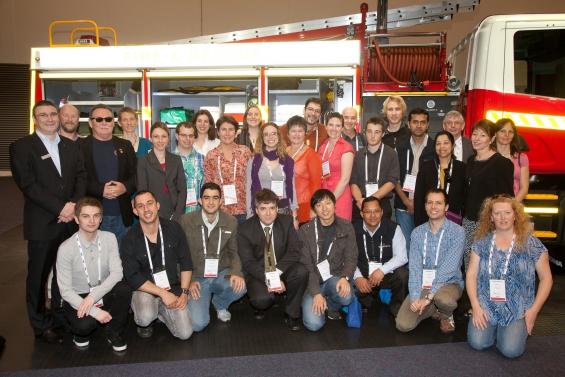Student Success

This article was published in the Autumn 2014 edition of Fire Australia magazine.
The Bushfire CRC scholarship program has so far produced 45 PhD graduates—with more to graduate in the next few years—ensuring the future of Australian fire research.
One of the primary reasons for the development of the Bushfire Cooperative Research Centre (CRC) in 2003 was to develop the next generation of fire researchers. At the time, Australia’s fire researchers were ageing, and there was a need for succession as the existing scientists approached the later stages of their careers. It was in these circumstances that the Bushfire CRC scholarship program began, committing to having 20 qualified PhD graduates by the end of 2010. History shows this was far exceeded, with 45 PhDs successfully completed. At the time of printing, there are a further 47 students working on their PhDs, aiming to complete their studies within the next few years.
The scholarship program was established to build research capacity and capability into the future, noted Bushfire CRC CEO Gary Morgan.
“Building this research capacity, particularly through the students, was going to be very important. The scholarship program was designed with this in mind, to give the students the opportunity to develop into the industry,” Mr Morgan said.
“We wanted to attract postgraduate students with a desire to work in the emergency services sector, and see them develop into future research leaders.
“Over the course of their studies, through their presentations at conferences and workshops, the students have been able to gain confidence within themselves about what they were doing and how this could assist the industry. With the guidance of the Bushfire CRC, they were able to get up, full of confidence, and be seen as equals among a lot of friends and provide their sound knowledge to the industry, helping us learn from their research,” Mr Morgan said.
The key to the success of the program was access. This was provided through connections with academics, end users of the research and other industry professionals.
Bushfire CRC Research Manager Lyndsey Wright has overseen the scholarship program since 2008.
“It is the strength of the opportunities given to the students which enables them to move into the industry so much more practically on completion of their studies. We work very hard to make students feel part of the Bushfire CRC family. They can pick up the phone and talk to people in the industry. This access gives them enormous benefits which are not normally available to students,” Ms Wright said.
The support provided is also an important factor.
“Through regular student reviews, the Bushfire CRC works actively with students and their university supervisors to determine the most appropriate way to support them through to completion of their PhD. Many students have indicated this has been a tangible benefit.”
Bushfire CRC lead end user and Manager of Fire Management at the ACT Parks and Conservation Service Neil Cooper said at a recent AFAC and Bushfire CRC conference he saw the effects of the program within the industry.
“I saw these new researchers coming through with enthusiasm, raw energy and untainted views. They came with all this eagerness and keenness, which was so exciting that it left goosebumps on your arms. They were really taking it on, they believed in what they were doing and they could see that they were making a difference in the industry, and I thought after that, ‘we are in a pretty good situation with this’,” recollected Mr Cooper.
A graduate of the program is Dr Briony Towers, now based at the Centre for Risk and Community Safety at RMIT and undertaking research with the Bushfire and Natural Hazards CRC. Dr Towers, who completed her PhD in 2011, noted that she gained plenty of benefits from her Bushfire CRC PhD.
“The Bushfire CRC gave me the opportunity to do applied research and the chance to solve a practical problem,” said Dr Towers.
This led to her research being developed into an animated children’s television series and an ebook, with effects stretching internationally.
“I was provided with a unique opportunity to work with people across the emergency management sector. I was able to consult with key people across the agencies to ensure that my research remained relevant and useful.
“It was really good to present my findings to industry professionals because I was able to see that the results I was getting were really interesting to them. In the same mould, by having access to other academics in the field, I was given great feedback and this gave me the confidence that what I was doing was really worthwhile.
“This has enabled me to develop a really amazing professional network of practitioners, policy-makers and other researchers. I think that if I mapped that network, a lot of the links would lead back to the Bushfire CRC,” Dr Towers said.
Here is a snapshot of the experiences of three Bushfire CRC postgraduate students.
Managing post-fire erosion
Like Dr Towers, former Bushfire CRC PhD student Dr Rowena Morris took full advantage of the scholarship program. Her research aimed to assess the effect of prescribed fires on sediment movement in the Mount Lofty Ranges near Adelaide. Dr Morris assessed existing erosion models to identify areas of high erosion potential following fire, completing her studies in 2013.
“Working out [whether you] can do a preventative measure to manage erosion, such as prescribed burning, was something I was looking into for my PhD,” Dr Morris explained.
She credited the support networks fostered by the Bushfire CRC in helping to alleviate some of the pressures of undertaking a PhD.
“There was fantastic camaraderie between the students, so I made a lot of friends through the Bushfire CRC, and we were able to share a lot of our information and ideas on how to approach our PhDs.
“The Bushfire CRC put us on numerous courses, such as media skills and how to present well, which really helped. Throughout my PhD, I presented at many conferences, including an international conference in Banff in Canada, and it was an excellent experience which the Bushfire CRC really enhanced,” Dr Morris said.
Professor Ross Bradstock of the University of Wollongong supervised Dr Morris while she undertook her research. He reiterated the importance of connecting students with the industry and the vital aspect the program played in achieving that.
“No student wants to undertake work that is irrelevant. Talking to people is just as critical as the formal side of things, and Rowena was very active in going to conferences and talking to the industry. She was very successful at that,” Professor Bradstock said.
Dr Rowena Morris is a Bushfire CRC PhD graduate. Through the University of Adelaide, her research studied erosion following prescribed burning in the Mount Lofty Ranges.
Warning fatigue
New Zealander Dr Brenda Mackie completed her PhD in recent months, exploring whether warning fatigue was a reality for individuals and communities threatened by bushfires. Her research challenged previous theorists’ ideologies on warning fatigue, taking more practical approach than the previous clinical and psychological research undertaken in the 1950s and 1960s.
“Warning fatigue was, early on, assumed to be a myth, but really, any disaster theorists who have talked about it essentially just repeated what the person before them said,” Dr Mackie explained.
“I thought, what if warning fatigue is not a myth? Then what might it look like? Unless you can operationalise it, unless you can put flesh on the bones of this phenomenon, then it’s not helpful to anybody,” she said of her research goals.
Bushfire CRC lead end user John Schauble, from the Victorian Fire Service Commissioner, explained that Dr Mackie had gathered empirical data to challenge previous ideas on warning fatigue.
“The question she approached is one everybody has traditionally assumed happens, but there has been no actual empirical backing for it,” Mr Schauble said.
“She has done the research, found some empirical data, and developed surveys to support that data. My role with Brenda has been to act as a bit of a sounding board for how her research will have an impact within industry, or within government. It is about making sure her research is relevant to the needs of government, and ensuring that it can eventually become part of policy or the way in which we address policy questions.”
Looking towards the future, Dr Mackie sees working in the industry as her primary aim.
“Working practically within the industry would be my first choice, combining applied research with community engagement.
“I want to work with agencies who are really interested in how their community is responding to what they are saying,” she said.
Dr Brenda Mackie is a Bushfire CRC PhD graduate. Through the University of Canterbury in New Zealand, she explored warning fatigue and how to recognise it, mitigate it and overcome it.
When a fire starts to burn
Dr Jaymie Norris completed his PhD in 2010 through the University of Western Australia. Since then, Dr Norris has been able to bring his fire-mapping knowledge and research on climate change issues and fire management to Victoria.
“I’d always hoped to end up working for one of the government departments, at that stage in Western Australia,” said Dr Norris.
“But I had a great opportunity to come across to Victoria and work for the Department of Environment and Primary Industries (DEPI), and bring the tools developed through my research approach to Victoria to help with the issues of climate change at that stage, but also broadly into fire management. It has been a really valuable experience,” said Dr Norris.
Gordon Friend, manager for Strategic Bushfire Risk Assessment at DEPI, observed that a specialised, deeper understanding that was developed through involvement with the Bushfire CRC was a valuable asset.
“Bushfire modelling is an emerging field. But the Bushfire CRC has done a lot of work in that area, so the students come out of that program pretty much skilled up to undertake that work,” Mr Friend explained.
Dr Jaymie Norris is a Bushfire CRC PhD graduate. Through the University of Western Australia, he studied fire intensity and how this affects microbials in the soil.
Important outputs
So what does it all mean? The scholarship program has more than doubled the number of PhDs injected into the industry than it set out to, with plenty more on the way in the next few years. It has been one of the most beneficial aspects of the entire Bushfire CRC, according to John Schauble.
“I think that the student program has been one of the most valuable outputs of the CRC. The fact that there is now a whole new generation of PhDs that have started their research life, or done a significant part of their research, in fire, is absolutely critical for the way in which we go forward,” said Mr Schauble.
And that, at the end of the day, is what the program set out to achieve.
Learn more about the strength and diversity of the Bushfire CRC scholarship program and the work of the students by watching three short videos here.
FOR MORE INFO ...
-
Communications Officer


